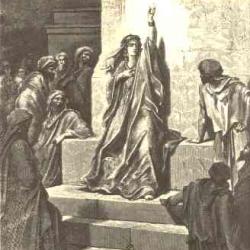A countercultural posture is not new to Christian history. For if Christians indeed think in trans-historical terms (what God is doing over human history, not what's popular opinion), then there is no scandal in the humble admission that our focus need simply be on developing good attitudes toward sex, good practices of interpersonal relationship, and good marriages. By extension, our shared witness to the wider culture will be one of persuasion, rather than coercion through the force of law.
I believe that the strength of the historical development of Christian anthropology lies in its thorough exploration of the dynamics of desire, and especially sexual desire. Simply put: I find the New Testament model of marriage to be responsive to both individual and social goods in ways that contemporary American attitudes are not. People desire lots of things, but only some of them bring life; and societies do well to encourage those that bring life.
The permanent sexual relationship of marriage between men and women is regarded in both the Old and New Testaments as a close analogue for the relationship between God and people, such that over time the Church came to understand marriage as a sacrament: a sacred symbol that serves the goods of individuals, families, societies, and the human family as a whole. By agreeing to marry, men and women take on social roles that call them to the kind of covenantal love that God shows. They further accept the possibility that their love will lead to the raising of children.
In a real sense, the linking of sex and procreation is a key example of that social encouragement, and the blurring or dissolution of that link is destructive to individuals, families, and societies, especially for children. The key opposition is not to homosexuality, but to the social acceptance of sex that is not ordered toward procreation.
For that reason, Catholic opposition to contraception is an important (if unpopular) element in that way of thinking. Its biblical, doctrinal, philosophical, and theological roots are, in my view, without question. The only question today is whether it remains a consistent response in a world of virtually unrestrained sexual desire.
I believe it does. Resistance to contraception is part of the logic that sees sexual desire as a privileged manner of healing the rift between men and women, as well as of orienting one's life toward goods beyond oneself, through family-making and the accompanying participation in social structures. Further, resistance to contraception is resistance to the social pressures that place the onus for unrestrained sex entirely on women, especially the most vulnerable. It is rooted in the recognition that sex without promise, without real love, does violence to people.
The Christian response, therefore, to American assumptions about sex and marriage must be the prophetic one: the pruning of sexual desire, for the sake of orienting all our desires toward a flourishing of community, especially its most vulnerable young members, and allowing our understanding of marriage, as rooted in the Bible and Christian tradition, to be a sign to the culture.





